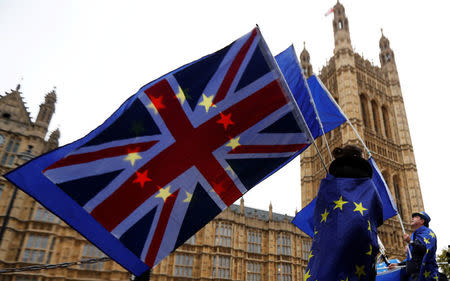Ireland says not ready to let Brexit talks move on to trade

By Padraic Halpin
DUBLIN (Reuters) - Britain and Ireland clashed over Brexit on Friday with Dublin saying it was not ready to allow the talks to move on to the second phase next month and London ruling out the much longer transitional period preferred by its neighbour.
The border between EU-member Ireland and Northern Ireland, which will be the UK's only land frontier with the bloc after its departure, is one of three issues Brussels wants broadly solved before it decides in December whether to move the talks onto a second phase about trade, as Britain wants.
Meeting in Dublin, Britain's Foreign Secretary Boris Johnson and his Irish counterpart Simon Coveney struck an amicable tone but remained far apart on several key aspects of the talks.
"Yes we all want to move onto phase two of the Brexit negotiations but we are not in a place right now that allows us to do that," Coveney said. "We have very serious issues, particularly around the border, that need more clarity."
He said Ireland's preference was that Britain as a whole would share the same regulations as the EU post-Brexit but if that was not possible, then London effectively needed to commit to allowing a tailor-made solution for Northern Ireland
"In the absence of that, from an Irish persecutive, there is a sense of jumping into the dark," Coveney said.
Johnson said moving the talks onto the next stage would help to resolve the border issue as many of the questions around it were bound up with Britain's future customs arrangement with the European Union.
"I want to stress that we in no way minimise the issue and wish to minimise the work that will need to be done by the UK and by Ireland together to get this right," Johnson said.
"The British government has absolutely no interest whatever in seeing any kind of hard border, that is the last thing we want to see as a result of that exercise."
Johnson added that he understood why Ireland wants a four to five-year post-Brexit transition period for Britain to allow businesses in Ireland time to adjust to any new arrangements, but said this was possible within a much tighter timescale.
"I understand the sentiment behind it, which is that everybody wants to have the maximum possible reassurance," he said.
"I think it's possible to do that in a much shorter timescale... Now is the time to make haste (on moving onto stage two of Brexit talks) and perhaps we don't need to wait quite so long to give business final certainty about how it's all going to work."
(Additional reporting by James Davey in LONDON,; editing by Kate Holton)

